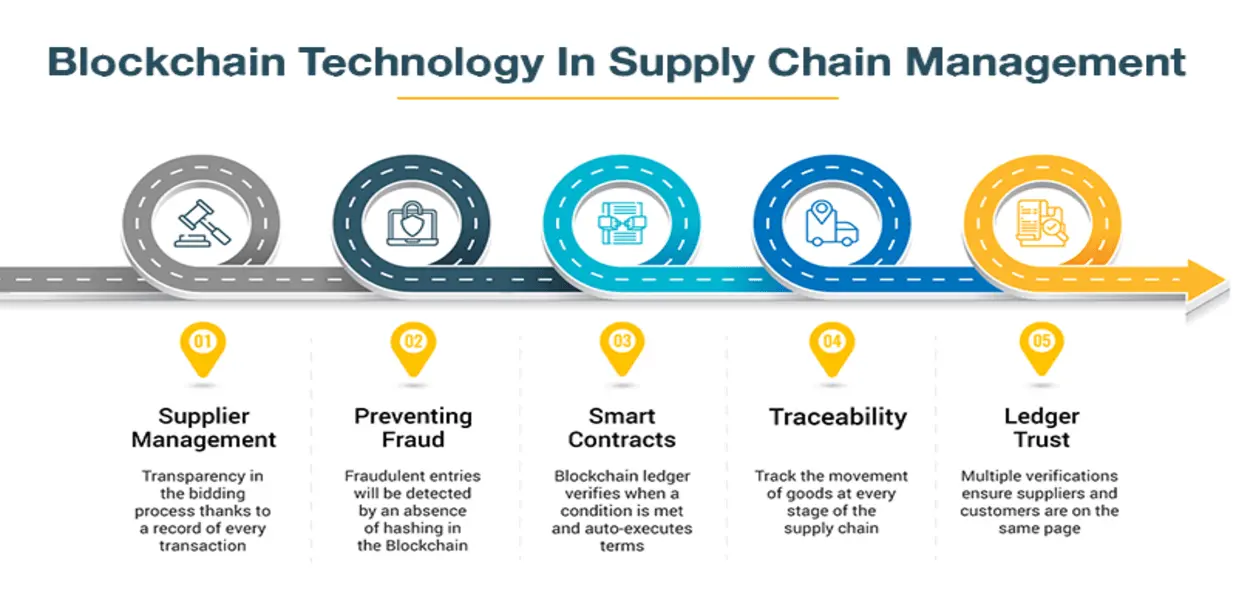Why You Need Blockchain Technology In Supply Chain Management
We used to identify Blockchain technology with cryptocurrencies like Bitcoin, but blockchain's promise stretches far beyond digital currency. But do you realize what's going on right now with this technology?
The technology that was once employed to defend digital currency has now emerged as a transformational force, upending traditional business models throughout Supply Chain Management.
Have you ever considered how Blockchain became a part of the industry that "manages the flow of goods, data, and finances related to a product or service, from raw material procurement to product delivery at its final destination"?
So, with the preceding sentence, you might have a rough notion of why blockchain is being used here, right? Yes, it is thanks to Blockchain's capacity to provide a transparent and tamper-proof ledger, which has shown to be quite useful in supply chain management. It provides end-to-end visibility, providing transparency, and responsibility throughout the supply chain.
My Readers, in this blog, we will learn about the issues that the supply chain faces in the absence of blockchain. We will also learn how the same Blockchain assisted with those issues. Finally, you will learn how a Blockchain Development Company may integrate blockchain technology into your supply chain business.
Challenges In the Supply Chain Industry In the Absence of Blockchain Technology
Challenges are everywhere, right? Supply Chain Industry is no different. It also faces several challenges, and in the absence of “blockchain technology”, some of these challenges become more prominent. Here are a few challenges which are most common in this industry:
Note: You can read the bold headings to save time, else for deep knowledge, please read all the points.
Lack of Transparency
Supply chain transparency becomes a huge challenge in the absence of blockchain. Because there is no one source of truth accessible to all parties, tracking the movement of commodities, establishing authenticity, and guaranteeing compliance becomes challenging. Lack of openness increases the danger of supply chain fraud, counterfeiting, and unethical practices.
Limited Traceability
Tracing the origin and travel of products becomes difficult in the absence of blockchain. Supply chain stakeholders face challenges in tracking and verifying the transit of commodities from suppliers to end users. This can hamper efforts to discover and resolve quality, safety, or recall issues.
Inefficient Data Management
Data generated by supply chain operations comes from a variety of sources, including suppliers, manufacturers, distributors, and retailers. Handling and integrating this data becomes difficult in the absence of a consistent and secure data management solution, such as blockchain. Inadequate data management can result in errors, delays, and inconsistencies, which can have an influence on decision-making and overall supply chain efficiency.
Increased Counterfeiting Risks
Counterfeit items pose a substantial threat to supply networks, resulting in financial losses and reputational harm for businesses. In the absence of blockchain technology, verifying the validity and provenance of items at each point of the supply chain becomes challenging. Counterfeit items have an easier time infiltrating the market, undermining customer trust and safety.
Complex Dispute Resolution
Disputes about quality, delivery, or contractual duties are prevalent in supply chain operations. Resolving these issues in the absence of blockchain can be time-consuming and complicated. The lack of a reliable and immutable record makes it difficult to identify the core cause, assign responsibility, and achieve an expedient resolution.
Manual and Paper-Based Processes
For record-keeping, documentation, and verification, traditional supply chains frequently rely on manual and paper-based operations. Errors, delays, and inefficiencies are common in these processes. The sector struggles to automate and streamline procedures in the absence of blockchain technology, resulting in increased administrative expenses and slower response times.
Limited Trust and Collaboration
For effective operations, supply chain stakeholders must trust and collaborate. Building trust, on the other hand, becomes difficult in the absence of a safe and transparent platform, such as blockchain. Lack of trust among suppliers, manufacturers, distributors, and retailers can stymie collaboration, information sharing, and collaborative decision-making.
Hopefully, you are still with me reading ahead.
Why Supply Chain Management Needs Blockchain Technology
So, now we are done with the challenges. But, do you think our thinkers, analyzers, and sharp-minded Business persons had failed to find a solution to integrate into their businesses to counter those challenges?
Yes, they found it, and they found Blockchain Technology quite useful. And why not, it offers unique features that address these challenges and has the potential to revolutionize supply chain management. Here are some reasons why supply chain management needs blockchain technology:
Enhanced Transparency and Traceability
Blockchain technology creates a decentralized and immutable ledger that records every transaction or event that occurs across the supply chain. Every transaction, from raw material procurement to final product delivery, may be safely kept on the blockchain. This transparency enables stakeholders to trace and verify the movement of products, ensuring authenticity and preventing fraud. It aids in the identification of bottlenecks, delays, or issues in the supply chain, allowing for early interventions and process changes.
Improved Security
Supply chains are susceptible to forgery, fraud, and data breaches. Blockchain technology provides improved security methods that can help to mitigate these dangers. The blockchain's decentralized design makes it harder for bad actors to manipulate or tamper with data recorded on the ledger. Furthermore, the cryptographic mechanisms used by blockchain ensure that data is safely transferred across stakeholders, lowering the danger of illegal access or data breaches. Companies may develop trust and improve the security of their supply chain operations by embracing blockchain.
Efficient Inventory Management
Inventory management can be streamlined with blockchain technology, which provides real-time visibility into inventory quantities, locations, and movements. With a shared and synced ledger, all supply chain participants may access accurate and up-to-date inventory information. This transparency aids in the optimization of inventory levels, the reduction of stockouts or overstocking, and the improvement of demand forecasting. Furthermore, blockchain-based smart contracts can automate inventory replenishment procedures by triggering orders when predetermined conditions are met, improving efficiency even further.
Simplified Auditing and Compliance
Regulation and standard compliance is a vital part of supply chain management. By providing a verifiable and auditable trail of every transaction recorded on the blockchain, blockchain technology streamlines auditing processes. Auditors can rapidly validate data to ensure compliance with requirements such as product quality standards, labor practices, and environmental restrictions. This transparency and audibility reduce the need for manual audits, reduces paperwork, and increases stakeholder trust.
Efficient Dispute Resolution
Disagreements and discrepancies are widespread in supply chain operations, causing delays and additional expenditures. Smart contracts, which are self-executing agreements that automatically enforce predefined criteria, can be created using blockchain technology. Smart contracts can help with conflict resolution by automating procedures and initiating actions based on established rules. This lowers the need for intermediaries and streamlines dispute resolution, resulting in more efficient and speedier supply chain processes.
Sustainable and Ethical Supply Chains
Also Read: Most Essential Use Cases of Blockchain Technology In The Finance Sector
Blockchain technology in supply chain can provide a transparent and immutable record of each transaction and process. And it can also aid in the development of sustainable and ethical processes. It enables businesses to trace the origin of raw materials, assuring compliance with fair trade, ethical sourcing, and sustainability criteria. Companies may demonstrate their commitment to ethical supply chain management, exceed consumer expectations, and create a brand reputation by embracing blockchain.
Knock Knock Reader!
I hope you are still there…
How We Can Help You Integrate Blockchain Technology In Supply Chain Management
Now, you know the challenges your supply chain business faces. You also know how blockchain technology can help you counter those challenges. But, how will you integrate blockchain technology in supply chain management? You need assistance, right?
So, you will knock on the doors of a blockchain development company. It will play a crucial role in integrating blockchain technology into the supply chain. And that’s where Infiniticube comes into the picture. We are a blockchain development company providing our services to various businesses wanting to integrate blockchain into their systems.
We have half a decade of experience in assisting our clients with their business requirements. Our team of experienced, skilled, and qualified staff will support you throughout the entire process with their cutting-edge services.
Here's an overview of how our team accomplishes this integration:
Understanding Supply Chain Processes
Our initial step is to obtain a thorough grasp of the client's (maybe your’s) supply chain activities. This entails outlining the various processes, players, data flow, and pain spots throughout the supply chain. We can design a viable blockchain solution by first understanding the existing difficulties and requirements.
Designing the Blockchain Architecture
We create the architecture for the blockchain solution based on our understanding of the supply chain activities. This includes deciding on the blockchain's type (public, private, or hybrid), consensus process, data format, and smart contract functionality. We make sure the architecture is tailored to the supply chain's specific needs, such as scalability, privacy, and interoperability.
To establish the best choice for supply chain integration, we analyze existing blockchain platforms and frameworks. We may select popular platforms such as Ethereum, Hyperledger Fabric, or Corda based on scalability, security, and industry-specific requirements. Alternatively, we might create a custom blockchain solution from the ground up to satisfy the unique demands of the supply chain.
Developing Smart Contracts and Chaincode
Smart contracts are self-executing contracts that use the blockchain to enforce predefined criteria. We create smart contracts or chain codes (in the case of Hyperledger Fabric) to automate and manage certain supply chain activities. Contract execution, payment settlement, inventory management, and product authenticity verification are all examples of this.
Establishing Network Infrastructure
We create the network infrastructure required for blockchain integration. Deploying and configuring blockchain nodes, establishing peer-to-peer connections, and maintaining network security are all part of this process. Secure data sharing, consensus methods, and data validation should all be supported by the infrastructure across supply chain partners.
Integrating with Existing Systems
To ensure seamless integration, we integrate the blockchain solution with the existing supply chain systems and technology. Integration with enterprise resource planning (ERP) systems, inventory management software, Internet of Things (IoT) devices, and other related systems may be required. The goal is to assure accurate and up-to-date information by enabling smooth data flow between the blockchain and existing infrastructure.
Testing, Deployment, and Maintenance
After developing the blockchain system, we put it through rigorous testing to ensure its functionality, security, and performance. The solution is deployed into the live environment after successful testing. We also provide continuous maintenance and support to address any difficulties, release upgrades, and guarantee the integrated blockchain solution runs smoothly.
We collaborate closely with supply chain stakeholders throughout the integration process, providing guidance, training, and support. Our blockchain technical experience and industry knowledge are critical to successfully integrating blockchain into the supply chain and delivering the desired benefits of transparency, traceability, and security.
Conclusion
To conclude this entire blog, I would say Supply chain management has been transformed by blockchain technology. And it’s no future, it is happening in our present. It can help businesses trace goods and services from origin to destination with increased precision and efficiency by offering a secure, transparent, and immutable ledger. This might result in cost savings, better customer service, and greater trust in the supplier chain.
Furthermore, blockchain technology can provide organizations with real-time visibility into inventory levels, allowing them to better manage their supply chains. Finally, it can assist to eliminate supply chain fraud and counterfeiting, which can save businesses millions of dollars each year.
Overall, it is a powerful tool that can assist businesses in improving their supply chain management operations and remaining competitive in today's global marketplace.
According to MarketsandMarkets, the global Blockchain Supply Chain Market was valued at approximately $253 million in 2020 and is expected to create revenue of approximately $3,272 million by the end of 2026, reflecting a CAGR of 53.2% from 2022 to 2027.
It's true, and I know you want your business to continue to grow.
Now, don't tell me you don't want your supply chain company to be a part of this landmark event that has potential growth for your business.
And if you want it, Contact us now. Let’s discuss all the doubts you have, and also let’s make the roadmap for your success with our blockchain development services.
 June 27, 2025
June 27, 2025
 Balbir Kumar Singh
Balbir Kumar Singh
 0
0
 June 13, 2025
June 13, 2025
 Balbir Kumar Singh
Balbir Kumar Singh
 0
0









Leave a Reply